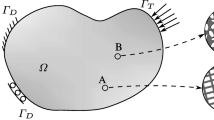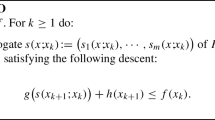Abstract
In this paper, we introduce an inertial accelerated outer quadratic approximation method for solving the split feasibility problem in Hilbert spaces. The algorithm uses projections onto closed balls approximations of the original split feasibility problem involved sets. Since the projection onto the closed ball has a closed form, the proposed method is thus convenient to implement. Moreover, it uses a self-adaptive step-size which does not need any prior information of the operator norm. Under some suitable assumptions, we establish and prove a strong convergence theorem for the proposed algorithm. Finally, we provide several numerical experiments to demonstrate the performances of our proposed method. We also give the applications of our result to elastic nets. Our method generalizes and improves many results in the literature.







Similar content being viewed by others
Availability of data and materials
Not applicable
References
Alakoya TO, Jolaoso LO, Mewomo OT (2020) A general iterative method for finding common fixed point of finite family of demicontractive mappings with accretive variational inequality problems in Banach spaces. Nonlinear Stud 27(1):213–236
Bauschke HH, Combettes PL et al (2011) Convex analysis and monotone operator theory in Hilbert spaces, vol 408. Springer, Berlin
Brooke M, Censor Y, Gibali A (2020) Dynamic string-averaging CQ-methods for the split feasibility problem with percentage violation constraints arising in radiation therapy treatment planning. Int Trans Oper Res 30(1):181–205
Byrne C (2002) Iterative oblique projection onto convex sets and the split feasibility problem. Inverse Probl 18(2):441–453
Byrne C (2003) A unified treatment of some iterative algorithms in signal processing and image reconstruction. Inverse Probl 20(1):103–120
Byrne C, Censor Y, Gibali A, Reich S (2012) The split common null point problem. J Nonlinear Convex Anal 13(4):759–775
Cegielski A (2012) Iterative methods for fixed point problems in Hilbert spaces, vol 2057. Springer, Berlin
Cegielski A (2015) General method for solving the split common fixed point problem. J Optim Theory Appl 165(2):385–404
Censor Y, Elfving T (1994) A multiprojection algorithm using Bregman projections in a product space. Numer Algorithms 8(2):221–239
Censor Y, Segal A (2009) The split common fixed point problem for directed operators. J Convex Anal 16(2):587–600
Censor Y, Elfving T, Kopf N, Bortfeld T (2005) The multiple-sets split feasibility problem and its applications for inverse problems. Inverse Probl 21(6):2071–2084
Censor Y, Bortfeld T, Martin B, Trofimov A (2006) A unified approach for inversion problems in intensity-modulated radiation therapy. Phys Med Biol 51(10):2353–2365
Censor Y, Gibali A, Reich S (2012) Algorithms for the split variational inequality problem. Numer Algorithms 59(2):301–323
Cholamjiak W, Cholamjiak P, Suantai S (2018) An inertial forward–backward splitting method for solving inclusion problems in Hilbert spaces. J Fixed Point Theory Appl 20(1):1–17
Cholamjiak P, Suantai S et al (2019) A new CQ algorithm for solving split feasibility problems in Hilbert spaces. Bull Malays Math Sci Soc 42(5):2517–2534
Dong QL, Cho Y, Zhong L, Rassias TM (2018) Inertial projection and contraction algorithms for variational inequalities. J Glob Optim 70(3):687–704
Gibali A, Liu LW, Tang YC (2018) Note on the modified relaxation CQ algorithm for the split feasibility problem. Optim Lett 12(4):817–830
Gibali A, Mai DT et al (2019) A new relaxed CQ algorithm for solving split feasibility problems in Hilbert spaces and its applications. J Ind Manag Optim 15(2):963–984
He S, Yang C (2013) Solving the variational inequality problem defined on intersection of finite level sets. Abstr appl Anal 2013:1–8
He S, Zhao Z (2013) Strong convergence of a relaxed CQ algorithm for the split feasibility problem. J Inequal Appl 2013(1):1–11
Kim JK, Tuyen TM, Ha MTN (2021) Two projection methods for solving the split common fixed point problem with multiple output sets in Hilbert spaces. Numer Funct Anal Optim 42(8):973–988
López G, Martín-Márquez V, Wang F, Xu HK (2012) Solving the split feasibility problem without prior knowledge of matrix norms. Inverse Probl 28(8):085004
Maingé PE (2008) Strong convergence of projected subgradient methods for nonsmooth and nonstrictly convex minimization. Set Valued Anal 16(7):899–912
Moudafi A (2010) The split common fixed-point problem for demicontractive mappings. Inverse Probl 26(5):055007
Ogbuisi F, Mewomo O (2017) Iterative solution of split variational inclusion problem in a real Banach spaces. Afr Mat 28(1):295–309
Ogbuisi FU, Mewomo OT (2021) Solving split monotone variational inclusion problem and fixed point problem for certain multivalued maps in Hilbert spaces. Thai J Math 19(2):503–520
Ogbuisi FU, Okeke CC, Mewomo OT (2022) A non operator norm dependent iterative solution of generalized split feasibility problems. Nonlinear Stud 29(1):235–245
Ogwo G, Izuchukwu C, Shehu Y, Mewomo O (2022) Convergence of relaxed inertial subgradient extragradient methods for quasimonotone variational inequality problems. J Sci Comput 90(1):1–35
Polyak BT (1964) Some methods of speeding up the convergence of iteration methods. USSR Comput Math Math Phys 4(5):1–17
Reich S, Tuyen TM (2020) Iterative methods for solving the generalized split common null point problem in Hilbert spaces. Optimization 69(5):1013–1038
Reich S, Truong MT, Mai TNH (2020) The split feasibility problem with multiple output sets in Hilbert spaces. Optim Lett 14(8):2335–2353
Sahu D, Cho Y, Dong Q, Kashyap M, Li X (2021) Inertial relaxed CQ algorithms for solving a split feasibility problem in Hilbert spaces. Numer Algorithms 87(3):1075–1095
Shehu Y, Gibali A (2020) Inertial Krasnoselskii–Mann method in Banach spaces. Mathematics 8(4):638
Shehu Y, Ogbuisi FU (2015) Convergence analysis for proximal split feasibility problems and fixed point problems. J Appl Math Comput 48(1):221–239
Shehu Y, Mewomo O, Ogbuisi F (2016) Further investigation into approximation of a common solution of fixed point problems and split feasibility problems. Acta Math Sci 36(3):913–930
Shehu Y, Vuong PT, Cholamjiak P (2019) A self-adaptive projection method with an inertial technique for split feasibility problems in Banach spaces with applications to image restoration problems. J Fixed Point Theory Appl 21(2):1–24
Suantai S, Pholasa N, Cholamjiak P (2018) The modified inertial relaxed CQ algorithm for solving the split feasibility problems. J Ind Manag Optim 14(4):1595
Taddele GH, Kumam P, Gebrie AG, Sitthithakerngkiet K (2020a) Half-space relaxation projection method for solving multiple-set split feasibility problem. Math Comput Appl 25(3):47
Taddele GH, Kumam P, Gebrie AG (2020b) An inertial extrapolation method for multiple-set split feasibility problem. J Inequal Appl 2020(1):1–22
Taddele GH, Kumam P, Gebrie AG, Abubakar J (2021) Ball-relaxed projection algorithms for multiple-sets split feasibility problem. Optimization 71(12):1–31
Takahashi W, Xu HK, Yao JC (2015) Iterative methods for generalized split feasibility problems in Hilbert spaces. Set Valued Var Anal 23(2):205–221
Tibshirani R (1996) Regression shrinkage and selection via the lasso. J R Stat Soc: Ser B (Methodol) 58(1):267–288
Tuyen TM, Ha NS, Thuy NTT (2019) A shrinking projection method for solving the split common null point problem in Banach spaces. Numer Algorithms 81(3):813–832
Wang F, Yu H (2021) An inertial relaxed CQ algorithm with an application to the LASSO and elastic net. Optimization 70(5–6):1101–1119
Wang J, Hu Y, Li C, Yao JC (2017) Linear convergence of CQ algorithms and applications in gene regulatory network inference. Inverse Probl 33(5):055017
Xu HK (2006) A variable Krasnosel’skii–Mann algorithm and the multiple-set split feasibility problem. Inverse Probl 22(6):2021
Xu HK (2010) Iterative methods for the split feasibility problem in infinite-dimensional Hilbert spaces. Inverse Probl 26(10):105018
Yang Q (2004) The relaxed CQ algorithm solving the split feasibility problem. Inverse Probl 20(4):1261–1266
Yao Y, Postolache M, Liou YC (2013) Strong convergence of a self-adaptive method for the split feasibility problem. Fixed Point Theory Appl 2013(1):1–12
Yu H, Zhan W, Wang F (2018) The ball-relaxed CQ algorithms for the split feasibility problem. Optimization 67(10):1687–1699
Acknowledgements
This research project is supported by Thailand Science Research and Innovation (TSRI) Basic Research Fund: Fiscal year 2023 under project number FRB670073/0164. The authors also acknowledge the financial support provided by the Center of Excellence in Theoretical and Computational Science (TaCS-CoE), KMUTT. Moreover, Guash Haile Taddele would like to thank the Postdoctoral Fellowship from King Mongkut’s University of Technology Thonburi (KMUTT), Thailand.
Author information
Authors and Affiliations
Contributions
All authors contributed equally to the manuscript and read and approved the final manuscript.
Corresponding author
Ethics declarations
Conflict of interest
The authors declare that they have no competing interests.
Additional information
Communicated by Joerg Fliege.
Publisher's Note
Springer Nature remains neutral with regard to jurisdictional claims in published maps and institutional affiliations.
Rights and permissions
Springer Nature or its licensor (e.g. a society or other partner) holds exclusive rights to this article under a publishing agreement with the author(s) or other rightsholder(s); author self-archiving of the accepted manuscript version of this article is solely governed by the terms of such publishing agreement and applicable law.
About this article
Cite this article
Taddele, G.H., Kumam, P., Sriwongsa, S. et al. An inertial accelerated outer quadratic approximation method for split feasibility problem with application to elastic net. Comp. Appl. Math. 43, 47 (2024). https://doi.org/10.1007/s40314-023-02559-5
Received:
Revised:
Accepted:
Published:
DOI: https://doi.org/10.1007/s40314-023-02559-5




